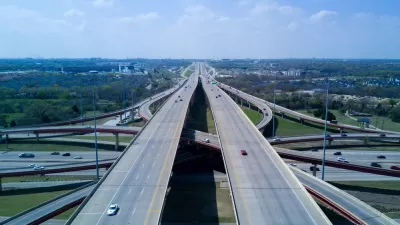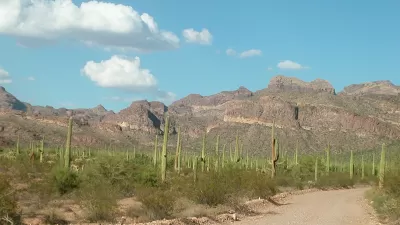Don't know if you've heard, but Arizona voters passed a new law in November, a nameless one called Proposition 207. And here's what preservationists have to say about it:"With Prop 207, we're dead in the water," Debbie Abele, Scottsdale historic preservation officer, told the East Valley Tribune.It's modeled after Oregon's controversial property-rights law Measure 37. In a nutshell, it allows property owners to seek compensation from the state for infringing on their right to use, divide, sell, or possess their property via a land-use law.
Don't know if you've heard, but Arizona voters passed a new law in November, a nameless one called Proposition 207. And here's what preservationists have to say about it:
"With Prop 207, we're dead in the water," Debbie Abele, Scottsdale historic preservation officer, told the East Valley Tribune.
It's modeled after Oregon's controversial property-rights law Measure 37. In a nutshell, it allows property owners to seek compensation from the state for infringing on their right to use, divide, sell, or possess their property via a land-use law.
People yell at me whenever I write a story about property rights. A former editor accused me of being a libertarian (a surreal McCarthyism moment). Obviously it's a divisive issue, but I can see both sides: If it weren't for laws, even Mount Vernon could be redeveloped-well, OK, not really. Then again, my neighbor in our historic district has to remove all her new windows because she didn't get approval first. Stuff like that fuels the "don't tell me what to do with my property" case.
Arizona's law means lawsuits, which gives city officials pause. Or stalls them permanently. After Prop 207 passed, the League of Arizona Cities and Towns issued a report that recommends governments to require 100 percent support before designating a historic area. Total agreement? Like that will happen.
In limbo is the only pre-war neighborhood in Tempe, wedged between Arizona State University and downtown. What are the chances that the 204-house neighborhood, built between 1900 and 1940, will become a historic district now?

Planetizen Federal Action Tracker
A weekly monitor of how Trump’s orders and actions are impacting planners and planning in America.

Restaurant Patios Were a Pandemic Win — Why Were They so Hard to Keep?
Social distancing requirements and changes in travel patterns prompted cities to pilot new uses for street and sidewalk space. Then it got complicated.

Maui's Vacation Rental Debate Turns Ugly
Verbal attacks, misinformation campaigns and fistfights plague a high-stakes debate to convert thousands of vacation rentals into long-term housing.

In California Battle of Housing vs. Environment, Housing Just Won
A new state law significantly limits the power of CEQA, an environmental review law that served as a powerful tool for blocking new development.

Boulder Eliminates Parking Minimums Citywide
Officials estimate the cost of building a single underground parking space at up to $100,000.

Orange County, Florida Adopts Largest US “Sprawl Repair” Code
The ‘Orange Code’ seeks to rectify decades of sprawl-inducing, car-oriented development.
Urban Design for Planners 1: Software Tools
This six-course series explores essential urban design concepts using open source software and equips planners with the tools they need to participate fully in the urban design process.
Planning for Universal Design
Learn the tools for implementing Universal Design in planning regulations.
Heyer Gruel & Associates PA
JM Goldson LLC
Custer County Colorado
City of Camden Redevelopment Agency
City of Astoria
Transportation Research & Education Center (TREC) at Portland State University
Camden Redevelopment Agency
City of Claremont
Municipality of Princeton (NJ)





























